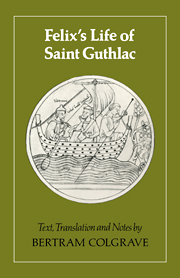SCRIPTURAL QUOTATIONS
Published online by Cambridge University Press: 18 December 2009
Summary
There are thirty–five direct quotations from Scripture which have been noted in the margin, but there may well be other Scriptural echoes which have been missed. It is clear that Felix knew the Scriptures well, and it is likely that for the most part he used the Vulgate version, for twenty–five of the quotations noted agree exactly with the Vulgate. But it must be remembered that the quotations are often very brief and it would therefore not be safe to come to any very definite conclusion as to the type of text Felix was using for either the Old or the New Testament.
In one or two places, however, it is clear that he is using a non–Vulgate version as for instance in Ps. 117. 7 (c. xxix) where the Old-Latin version printed by Sabatier (Bibliorum Sacrorum Latinae Versiones Antiquae, ed. Pierre Sabatier, 3 vols. Paris, 1743) reads et ego videbo inimicos meos identically with Felix and against the Vulgate reading of despiciam. In Ps. 55.10 (c. xxx) other ancient versions read convertantur with Felix, while the Vulgate and the Old–Latin version read convertentur. In c. XLIX where Felix is quoting, or rather adapting a quotation, from Ps. 20. 12, the quod of Felix is supported by the Old–Latin version. In quoting Isa. 1. 19 (c. XXXVIII) Felix uses oboedieritis (a reading supported by all the MSS. of the Vita) where the Vulgate reads volueritis. Sabatier (op. cit.) quotes from Fulgentius the reading obaudieritis, but no example of oboedieritis is mentioned.
- Type
- Chapter
- Information
- Felix's Life of Saint GuthlacTexts, Translation and Notes, pp. 57 - 58Publisher: Cambridge University PressPrint publication year: 1985



